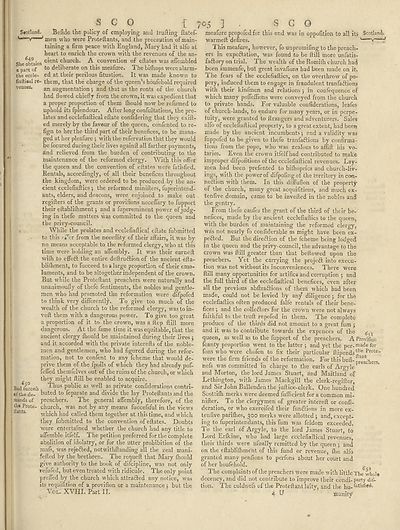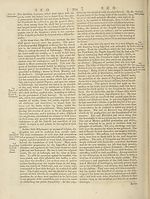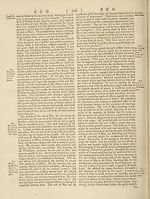Encyclopaedia Britannica, or, a Dictionary of arts, sciences, and miscellaneous literature : enlarged and improved. Illustrated with nearly six hundred engravings > Volume 18, RHI-SCR
(743) Page 705
Download files
Complete book:
Individual page:
Thumbnail gallery: Grid view | List view

SCO
649 _
She obtains
a part of
the eccle-
Seotland. Beiide the policy of employing and trailing ftatef-
' men who were Proteftants, and the precaution of main¬
taining a firm peace with England, Mary had it alfo at
heart to enrich the crown with the revenues of the an¬
cient church. A convention of eftates was affembled
to deliberate on this meafure. The bilhops were alarm¬
ed at their perilous fituation. It was made known to
liaftieal re- them, that the charge of the queen’s houfehold required
venues. an augmentation •, and that as the rents of the church
had flowed chiefly from the crown, it was expedient that
a proper proportion of them fhould now be refumed to
uphold its fplendour. After long confultations, the pre¬
lates and ecclefialtical elfate confidering that they exit¬
ed merely by the favour of the queen, confented to re-
fign to her the third part of their benefices, to be mana¬
ged at her pleafure ; with the refervation that they would
* be fecured during their lives againfl: all farther payments,
and relieved from the burden of contributing to the
maintenance of the reformed clergy. With this offer
the queen and the convention of eitates were fatisfied.
Rentals, accordingly, of all their benefices throughout
the kingdom, were ordered to be produced by the an¬
cient ecclefiaftics 5 the reformed minifters, fuperintend-
ants, elders, and deacons, were enjoined to make out
regifters of the grants or provifions neceffary to fupport
their eftablilhment j and a fupereminent power of judg¬
ing in thefe matters was committed to the queen and
the privy-council.
While the prelates and ecclefiaftical ellate fubmitted
to this (j^er from the neceflity of their affairs, it was by
no means acceptable to the reformed clergy, who at this
time were holding an affembly. It was their earneft
wifh to effeft the entire deftrudlion of the ancient efta-
blifhment, to fucceed to a large proportion of their emo¬
luments, and to be altogether independent of the crown.
But while the Proteftant preachers were naturally and
unanimoufly of thefe fentiments, the nobles and gentle¬
men who had promoted the reformation were difpofed
to think very differently. To give too much of the
wealth of the church to the reformed clergy, was to in-
veft them with a dangerous power. To give too great
a proportion of it to the crown, was a ftep dill more
dangerous. At the fame time it was equitable, that the
ancient clergy fhould be maintained during their lives j
and it accorded with the private interefls of the noble¬
men and gentlemen, who had figured during the refor¬
mation, not to confent to any fcheme that would de¬
prive them of the fpoils of which they had already pof-
feffed themfelves out of the ruins of the church, or which
they might ftill be enabled to acquire.
Bad fuccefs Thus public as well as private confiderations contri-
cf the de- buted to feparate and divide the lay Proteftants and the
preachers. The general affembly, therefore, of the
church, was not by any means fuccefsful in the views
which had called them together at this time, and which
they fubmitted to the convention of eftates. Doubts
were entertained whether the church had any title to
affemble itfelf. The petition preferred for the complete
abolition of idolatry, or for the utter prohibition of the
mafs, was rejefled, notwithftanding all the zeal mani-
fefted by the brethren. The requeft that Mary fhould
give authority to the book of difcipline, was not only
refufed, but even treated with ridicule. The only point
preffed by the church which attra£led any notice, was
its requifition of a provifion or a maintenance; but the
VoL. XVIII, Part II.
mands of
the Prote
darts.
705 ] ■ SCO
meafure propofedfor this end was in oppofition to all its Scotland,
warmeft defires. u—y—«
This meafure, however, fo unpromifing to the preach¬
ers in expectation, was found to be ftill more unfatis-
faftory on trial. The wealth of the Romifh church had
been immenfe, but great invafions had been made on it.
The fears of the ecclefiaftics, on the overthrow of po¬
pery, induced them to engage in fraudulent tranfaCtions
with their kinfmen and relations; in confequence of;
which many poffeflions were conveyed from the church
to private hands. For valuable confiderations, leafes
of church-lands, to endure for many years, or in perpe¬
tuity, were granted to ftrangcrs and adventurers. Sales
alfo of ecclefiaftical property, to a great extent, had been
made by the ancient incumbents j and a validity wTas
fuppofed to be given to thefe tranfaftions by confirma¬
tions from the pope, who was zealous to affift his vo¬
taries. Even the crown itfelf had contributed to make
improper difpofitions of the ecclefiaftical revenues. Lay¬
men had been prefented to biflioprics and church-liv¬
ings, wfith the power of difpofingot the territory in con¬
nexion with them. In this diffufion of the property
of the church, many great acquifitions, and much ex-
tenfive domain, came to be invefted in the nobles and
the gentry.
From thefe caufes the grant of the third of their be¬
nefices, made by the ancient ecclefiaftics to the queen,
with the burden of maintaining the reformed clergy,
was not nearly fo confiderable as might have been ex-
pefted. But the direXion of the fcheme being lodged
in the queen and the privy, council, the advantage to the
crown was ftill greater than that beftowed upon the
preachers. Yet the carrying the projeX into execu¬
tion w’as not without its inconveniences. There were
ftill many opportunities for artifice and corruption 5 and
the full third of the ecclefiaftical benefices, even after
all the previous abftraXions of them which had been
made, could not be levied by any diligence; for the
ecclefiaftics often produced falfe rentals of their bene¬
fices •, and the colleXors for the crown were not always
faithful to the truft repofed in them. The complete
produce of the thirds did not amount to a great fum j
and it was to contribute towards the expences of the 6cl
queen, as well as to the fupport of the preachers. A Provifion
fcanty proportion went to the latter ; and yet the per-ma(lefor
fons who were chofen to fix their particular ftipendsthe Prote*
were the firm friends of the reformation. For this bufi-
nefs was committed in charge to the earls of Argyle1
and Morton, the lord James Stuart, and Maitland of
Lethington, with James Mackgill the clerk-regifter,
and Sir John Ballenden the juft ice-clerk. One hundred
Scottifti merks were deemed fufficient for a common mi-
nifter. To the clergymen of greater intereft or conft-
deration, or who exercifed their funXions in more ex-
tenfive parilhes, 300 merks were allotted ; and, except¬
ing to fuperintendants, this fum was feldom exceeded.
To the earl of Argyle, to the lord James Stuart, to
Lord Erfkine, who had large ecclefiaftical revenues,
their thirds were ufuallv remitted by the queen ; and
on the eftablifhment of this fund or revenue, ftie alfo
granted many penfions to perfons about her court and
of her houfehold. r '
The complaints of the preachers were made with little The whols
decency, and did not contribute to improve their condi-party dif-
tion. The coldnefs of the Proteftant laity, and the huJatisfied,
4 U inanity
649 _
She obtains
a part of
the eccle-
Seotland. Beiide the policy of employing and trailing ftatef-
' men who were Proteftants, and the precaution of main¬
taining a firm peace with England, Mary had it alfo at
heart to enrich the crown with the revenues of the an¬
cient church. A convention of eftates was affembled
to deliberate on this meafure. The bilhops were alarm¬
ed at their perilous fituation. It was made known to
liaftieal re- them, that the charge of the queen’s houfehold required
venues. an augmentation •, and that as the rents of the church
had flowed chiefly from the crown, it was expedient that
a proper proportion of them fhould now be refumed to
uphold its fplendour. After long confultations, the pre¬
lates and ecclefialtical elfate confidering that they exit¬
ed merely by the favour of the queen, confented to re-
fign to her the third part of their benefices, to be mana¬
ged at her pleafure ; with the refervation that they would
* be fecured during their lives againfl: all farther payments,
and relieved from the burden of contributing to the
maintenance of the reformed clergy. With this offer
the queen and the convention of eitates were fatisfied.
Rentals, accordingly, of all their benefices throughout
the kingdom, were ordered to be produced by the an¬
cient ecclefiaftics 5 the reformed minifters, fuperintend-
ants, elders, and deacons, were enjoined to make out
regifters of the grants or provifions neceffary to fupport
their eftablilhment j and a fupereminent power of judg¬
ing in thefe matters was committed to the queen and
the privy-council.
While the prelates and ecclefiaftical ellate fubmitted
to this (j^er from the neceflity of their affairs, it was by
no means acceptable to the reformed clergy, who at this
time were holding an affembly. It was their earneft
wifh to effeft the entire deftrudlion of the ancient efta-
blifhment, to fucceed to a large proportion of their emo¬
luments, and to be altogether independent of the crown.
But while the Proteftant preachers were naturally and
unanimoufly of thefe fentiments, the nobles and gentle¬
men who had promoted the reformation were difpofed
to think very differently. To give too much of the
wealth of the church to the reformed clergy, was to in-
veft them with a dangerous power. To give too great
a proportion of it to the crown, was a ftep dill more
dangerous. At the fame time it was equitable, that the
ancient clergy fhould be maintained during their lives j
and it accorded with the private interefls of the noble¬
men and gentlemen, who had figured during the refor¬
mation, not to confent to any fcheme that would de¬
prive them of the fpoils of which they had already pof-
feffed themfelves out of the ruins of the church, or which
they might ftill be enabled to acquire.
Bad fuccefs Thus public as well as private confiderations contri-
cf the de- buted to feparate and divide the lay Proteftants and the
preachers. The general affembly, therefore, of the
church, was not by any means fuccefsful in the views
which had called them together at this time, and which
they fubmitted to the convention of eftates. Doubts
were entertained whether the church had any title to
affemble itfelf. The petition preferred for the complete
abolition of idolatry, or for the utter prohibition of the
mafs, was rejefled, notwithftanding all the zeal mani-
fefted by the brethren. The requeft that Mary fhould
give authority to the book of difcipline, was not only
refufed, but even treated with ridicule. The only point
preffed by the church which attra£led any notice, was
its requifition of a provifion or a maintenance; but the
VoL. XVIII, Part II.
mands of
the Prote
darts.
705 ] ■ SCO
meafure propofedfor this end was in oppofition to all its Scotland,
warmeft defires. u—y—«
This meafure, however, fo unpromifing to the preach¬
ers in expectation, was found to be ftill more unfatis-
faftory on trial. The wealth of the Romifh church had
been immenfe, but great invafions had been made on it.
The fears of the ecclefiaftics, on the overthrow of po¬
pery, induced them to engage in fraudulent tranfaCtions
with their kinfmen and relations; in confequence of;
which many poffeflions were conveyed from the church
to private hands. For valuable confiderations, leafes
of church-lands, to endure for many years, or in perpe¬
tuity, were granted to ftrangcrs and adventurers. Sales
alfo of ecclefiaftical property, to a great extent, had been
made by the ancient incumbents j and a validity wTas
fuppofed to be given to thefe tranfaftions by confirma¬
tions from the pope, who was zealous to affift his vo¬
taries. Even the crown itfelf had contributed to make
improper difpofitions of the ecclefiaftical revenues. Lay¬
men had been prefented to biflioprics and church-liv¬
ings, wfith the power of difpofingot the territory in con¬
nexion with them. In this diffufion of the property
of the church, many great acquifitions, and much ex-
tenfive domain, came to be invefted in the nobles and
the gentry.
From thefe caufes the grant of the third of their be¬
nefices, made by the ancient ecclefiaftics to the queen,
with the burden of maintaining the reformed clergy,
was not nearly fo confiderable as might have been ex-
pefted. But the direXion of the fcheme being lodged
in the queen and the privy, council, the advantage to the
crown was ftill greater than that beftowed upon the
preachers. Yet the carrying the projeX into execu¬
tion w’as not without its inconveniences. There were
ftill many opportunities for artifice and corruption 5 and
the full third of the ecclefiaftical benefices, even after
all the previous abftraXions of them which had been
made, could not be levied by any diligence; for the
ecclefiaftics often produced falfe rentals of their bene¬
fices •, and the colleXors for the crown were not always
faithful to the truft repofed in them. The complete
produce of the thirds did not amount to a great fum j
and it was to contribute towards the expences of the 6cl
queen, as well as to the fupport of the preachers. A Provifion
fcanty proportion went to the latter ; and yet the per-ma(lefor
fons who were chofen to fix their particular ftipendsthe Prote*
were the firm friends of the reformation. For this bufi-
nefs was committed in charge to the earls of Argyle1
and Morton, the lord James Stuart, and Maitland of
Lethington, with James Mackgill the clerk-regifter,
and Sir John Ballenden the juft ice-clerk. One hundred
Scottifti merks were deemed fufficient for a common mi-
nifter. To the clergymen of greater intereft or conft-
deration, or who exercifed their funXions in more ex-
tenfive parilhes, 300 merks were allotted ; and, except¬
ing to fuperintendants, this fum was feldom exceeded.
To the earl of Argyle, to the lord James Stuart, to
Lord Erfkine, who had large ecclefiaftical revenues,
their thirds were ufuallv remitted by the queen ; and
on the eftablifhment of this fund or revenue, ftie alfo
granted many penfions to perfons about her court and
of her houfehold. r '
The complaints of the preachers were made with little The whols
decency, and did not contribute to improve their condi-party dif-
tion. The coldnefs of the Proteftant laity, and the huJatisfied,
4 U inanity
Set display mode to:
![]() Universal Viewer |
Universal Viewer | ![]() Mirador |
Large image | Transcription
Mirador |
Large image | Transcription
Images and transcriptions on this page, including medium image downloads, may be used under the Creative Commons Attribution 4.0 International Licence unless otherwise stated. ![]()
| Permanent URL | https://digital.nls.uk/193028366 |
|---|
| Attribution and copyright: |
|
|---|
| Description | Ten editions of 'Encyclopaedia Britannica', issued from 1768-1903, in 231 volumes. Originally issued in 100 weekly parts (3 volumes) between 1768 and 1771 by publishers: Colin Macfarquhar and Andrew Bell (Edinburgh); editor: William Smellie: engraver: Andrew Bell. Expanded editions in the 19th century featured more volumes and contributions from leading experts in their fields. Managed and published in Edinburgh up to the 9th edition (25 volumes, from 1875-1889); the 10th edition (1902-1903) re-issued the 9th edition, with 11 supplementary volumes. |
|---|---|
| Additional NLS resources: |
|

